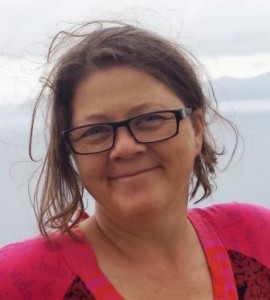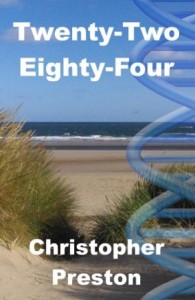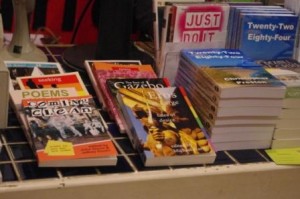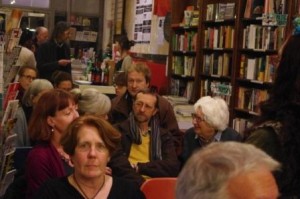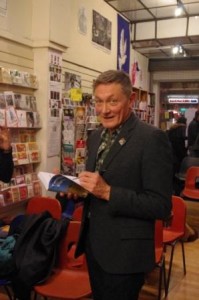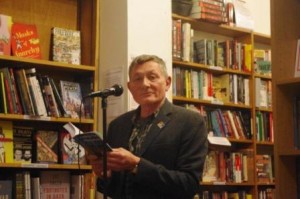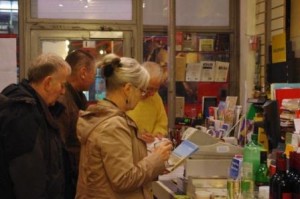She wept. For the third time she’d lost a child. The journalist had offered hope – a way home – but it hadn’t worked. She’d seen it all unfold on her phone and now regretted talking to him. Better to have remained unknown, but she’d done it for her child. The cold killed him – the conditions here. Perhaps it was for the best – they would have taken him from her – another type of loss – knowing he was alive. Now that the eyes of the world were looking on the other side of the earth there was a chance to disappear – find her husband. According to her phone, he was a prisoner. Maybe she could find him.
Category: Writing
Working the tube
He is there again on my return journey still working his way up and down the carriage on the Hammersmith an City Line.
‘Excuse me ladies and gents sorry to bother you … sorry to interrupt your journey. I’m currently homeless, I’m eighteen and have no family. I’m trying to get some cash together for something to eat and a room in a hostel tonight. Anything would be much appreciated. Anything? Have a good evening.’
The travellers in my section of the carriage studiously concentrate on what ever they are staring at. The advertisements for ‘Welthify’, their reflection in the window or just thin air in front of them. One woman is looking in her bag.
‘I don’t have any cash, but I might have some food here.’
I shrug as he passes. I seldom carry cash these days – sometimes a pound coin for the locker at the swimming pool but the token on my key ring works just as well. He is young, a few blond bristles show on his upper lip. His face is evenly dirty – blond hair stiff with grime looks as if it was once stylish but it’s grown out. He wears a sleeveless padded vest far too large for him over a hoodie. Grubby blue trackie bottoms sit on top of a still respectable looking pair of black designer trainers.
Two black travellers just past me contribute. The young woman has a handful of coins which she continues to play with. I want to help – offer him a shower and wash his clothes, but I know that’s not wise. An older gay man – could be easily misconstrued. He needs professional help.
As the tube draws near my stop, the young man appears again waiting to get off. He digs into his trackie pockets and withdraws handfuls of coins which he seems to be counting.
‘Ca, ca, ca boom ca, ca, cabomm. Brrroom, cha, cha, cha. Na, nana na, nana na.’ He chants his mantra.
Like me he knows which door of the train will stop by the station exit. I follow him as he bounds up the stairs. I wonder what he will to exit the station. Probably jump over the barrier or follow someone closely through the gates. By the time I get up the stairs he’s on the other side and buying something from the kiosk. A drink or sweets I imagine. I look back as I exit on to the street. He’s rubbing a scratch – card with a coin. I wonder if that works for him?
the Neighbours
‘Go over and see if there’s anything we can do,’ she said.
Pete hesitated. He was still deep in shock from the news and couldn’t for the moment think how he could help.
His wife seemed to understand his dilemma. ‘The offer will be enough – to show support.’
He remembered the day they had moved in. The little girl was only a baby, the same age as their daughter. He’d said his name was Mohammed.
‘We’ll call you Mo; we shorten everything here. I’m Pete – no one calls me Peter and the wife is Sue.
Mo was an engineer, he came to help re-build the city after the second earthquake. They’d got on well, after a couple of cultural gaffs. Pete quickly found out that a beer with Mo was out of the question and they wouldn’t be eating Sue’s famous egg and bacon pie – a national dish. Luckily, she was ace at roast lamb and the other national dish, Pavlova was much appreciated. The gesture was returned with a middle eastern version and recipes swapped.
As Pete knocked on the back door, he couldn’t quite believe that his friend Mo wouldn’t be answering. It opened a few centimetres and he could see Jamal’s tear-stained face suddenly full of fear. In that moment, Pete understood that he was a pakeha, a white male, like the arsehole who’d shot his mate Mo and all the others. He’d grown up here around guys like that and mostly gave them a wide berth. He once defended his friend Hemi at primary school from one such bully making anti Maori comments in the playground – the only time he’d ever hit anyone.
‘It’s only me … Pete … can we do anything?’
Jamal relaxed and shook her head.
Pete felt tears welling. He didn’t recall having done this as an adult. He must have cried as a baby but grown men don’t cry. ‘This isn’t supposed to happen in New Zealand,’ he said.
‘We came here because it was safe. Where can we go now?’ she said.
‘It is … it was …’ Tears were streaming down his face. ‘This is not who we are.’ He was shaking with grief and anger. ‘We’ve lost so much today.’
Mother and Daughter
Short & Sweet Theatre
Ive been writing, developing and directing new plays in the UK for many years now, so its with considerable excitement that I find myself directing a short play in New Zealand for the first time since 1976.
Id heard of the Short & Sweet Festival and duly did the google thing, sent in a brief list of directing and dramaturgical work and was delighted to be asked to join the festival. The next thing that happened was the arrival of a zip file containing 28 ten minute plays to be read. My task was to choose five plays and list them in order of preference and to my surprise my first choice came back to me.
In the Pound by Judith Cowley spoke to me so strongly that whichever way round I arranged my list of five plays, this one always came out at number one. Another google and I found that Judith has just completed the MA in Script Writing from the International Institute of Modern Letters, Victoria University, Wellington. Heres what she wrote at the beginning of the course.
My family have always been story-tellers. A family motto could be ‘Don’t let the truth get in the way of a good story.’ Although my head was filled with stories, I avoided the call to write for years. The call, like a determined suitor, didn’t give up. I gave him many excuses. I am too busy, too tired. I have to have a real job. It is not my forte. He waited, watching from the other side of the dance floor.
A year ago I fell over a cliff. My injuries were minor, scratches and mild concussion. But the fall woke me up. When the call to write next came, I took his hand and said, ‘Let’s dance.’
In the Pound is indeed a dance. The ties that once held Bevan and June have broken. The characters dance around their emotions which rise and fall as they argue, laugh and cry. Can Bevan charm his way back with memories of the good times or will their failure as parents win out?
Its a privilege to be directing this first play by a new writer, because I know Judith is going to be an important voice in New Zealands cultural future.
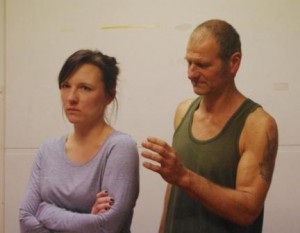
Casting actors is always a tense time. Will I get the right ones? Will they be available? Short & Sweet organised audition sessions according to age so I went to two, Men over 40 and Women over 35. It was slightly strange; directors sitting in a row watching actors come in, introduce themselves and perform a monologue. Ahi, the co-ordinator got them to do the monologue in a different way, to show off versatility and ability to take direction. There werent many actors, but amazingly the two I needed turned up. I offered and they accepted. We are now in the rehearsal process, delighting in Judiths characters and dialogue. Everything we need to know is in the text and were all looking forward to the performances.
The way it works is that there are two groups of plays. In the Pound plays in week one and if we get enough votes from the audience, we will join the best of week two on the Gala Night.
Heres how you can help.
If you are in Auckland, book tickets for any date in week one & vote for In the Pound.
If you know anyone in Auckland or nearby, forward and share this post.
Visit the Short & Sweet Facebook Page . In the Pound will soon have it’s own page with info, pix and stuff (if I can manage the technology).
Gay Dads Chapter 1
It’s Nineteen Ninety and I’m feeling pretty good about myself. After twenty years, I’ve managed to finally give up smoking; I have a cute little boyfriend called Adrian and a whole house in East London bought for a song ten years ago. I’ve just done the design for a new play at the Bush Theatre and am going back to Theatre Go Round for their next kids show. I don’t let on about doing children’s theatre but it’s money and I can whack the design out in a couple of afternoons. More importantly I’m designing for a translation of a new German play to have a British premier at the Lyric Hammersmith Studio. The mortgage will be paid, what can possibly go wrong? Answer – listening to Radio 4. People often talk about where they were when import events happen. For me it’s always the same, I’m in the kitchen having breakfast and listening to Radio 4.
Thus it is one morning that the Human Fertilisation and Embryology Act is being discussed by parliament and some Tory tosser is complaining that Lesbians are getting free sperm from banks. There’s outrage that children can be conceived by Lesbians and on the National Health. Now the previous decade has been tough, what with AIDS and the scare mongering that has gone on. We’ve lost friends and ex lovers. Adrian and I have gone over it hundreds of times; have we always been safe? We have, but you never know and paranoia is a terrible thing. We’ve even been tested for other sexually transmitted diseases under false names, believing that MargaretThatcher is going to round us all up into isolation camps, although when questioned about confidentiality, the clinic assures us that there is no way the government could access our records. We are not mollified by this and don’t come clean. We leave feeling somewhat guilty that we’ve just cost the clinic twelve pounds each to open new files.
I don’t say anything to Adrian about the Lesbians and sperm banks, It’s an idea that’s growing; a possibility that I can help and strike a small protest against the regime and pass on my genes at the same time. It’s all quite muddled at the moment so I need to think about it.
Later in the week we’re down in our gay local, the Old Globe on the Mile End Road. It’s a narrow strangely shaped pub which has recently gone Gay. Pubs are in difficulty these days so that before going under, they try to ride it out on the pink pound. Adrian and I are classified as DINKYs and have a few bob to splash around. We say to ourselves that we’re only going in for the papers, I have a pint of bitter, Adrian a half of Guinness and we sit reading and watching the drag show. This week it’s Dave Lynn, who unlike most of the others, can sing. He’s also the only one who uses a male name, which for me at least acknowledges his gender. I’m not keen on drag and spend my time between wondering if this is an insult to real women and being intrigued how they manage to tuck their genitals away. It must be awfully uncomfortable. Adrian used to sing in the northern clubs and so enjoys this middle of the road music with a camp spin.
Later he says to Dave, ‘What’s a nice Jewish boy like you doing in this job?’
‘I get twice the money if I sing in a frock,’ he archly replies.
We walk home with the ‘gaypers’ under our arms.
‘How do you know he’s Jewish?’ I ask.
‘I just do,’ he shrugs.
I’m still thinking about donating sperm, the trouble is I don’t know any Lesbians, let alone ones who might want to have a baby. I’ve decided I don’t want to do all the nappy changing (occasional duty is fine) and the getting up in the night to warm milk. In the more sensible light of home I find the personal ads. They are mostly men looking for men and a few women looking for women. Surprisingly the mixed section is quite large. These include bisexuals or ‘Bi curious’ or straight couples looking for threesomes. There are, I notice these days, a growing number of ads for sperm donors from Lesbians. They range from complete anonymity with no contact required to ‘full involvement welcomed’.
‘What do you think?’ I say to Adrian.
‘I don’t think I could do the no contact required thing. I’d need to be involved.
‘I could do it, might be interesting to be contacted in eighteen years time. Kids want to know who their fathers are, don’t they?’
He shrugs. ‘It’s fine by me Mark; it’s not going to change us, is it?’
I sit down with the Pink Paper looking at the classifieds. I’ve long been fascinated by these adverts though never had the courage before to reply to any. There is a notice at the beginning of the section saying that ‘Men’s advertisements are accepted on the understanding that they are submitted by and addressed to, persons over the age of 21.’ It’s a reminder that we are still illegal under that age. There is no such disclaimer for Lesbians. The men’s columns, the most numerous by far, come from all over the country. Many ask for discretion (probably still in the closet) and older guys are mostly looking for something younger, while none of the young ones are looking for older. Some are just looking for fun and fuck buddies, others ask for photos and some want explicit photos. I’m not sure how you get explicit photos past the chemist; I’d need to invest in a Polaroid camera. It’s the mixed column where I find the sperm donors but they are interspersed with pleas for Lesbians to come forward for ‘beneficial arrangements’. Guys have fallen in love with foreigners who need to get married in order to stay in the country.
I notice that there’s a guy advertising himself as ‘Healthy’. He wants to father a child ‘positive role essential, would like someone caring. London area only.’ This week there are two possibilities for me, one advertiser seeking anonymity and another wanting to meet but have no involvement.
LESBIAN COUPLE seek anonymous donor. No involvement London areas. ALA Box 2267
And
LESBIAN, seeks sperm donor, no involvement. Oxford area, can travel. ALA Box 2265
I sit at the Amstrad and compose letters. I write that I’m happy to be anonymous but that if any child in eighteen years time would like to get in touch that would be OK as well. I also add that I’m intending to have and HIV test. I post them off to the box number with a stamped envelope inside each one and forget about it.
The woman from Oxford is the first to reply, by phone two weeks later. I’m slightly surprised that she’s phoned rather than written, but when I find that she is in her late thirties, I realise that she is probably in a bit of a hurry. Her name is Emily but she doesn’t sound like one. Her voice has warm cracked overtones of smoky bars and excessive jazz singing and she’s been a nurse. She seems quite vague so I press her about her circumstances and why she wants a child. He partner of ten years has recently died leaving her two daughters to look after. I immediately worry that someone is gong to take these teenage daughters away form her but all is well and neither the state nor her partner’s relatives have intervened. Emily says she is coming to London at the weekend and can meet us at a friend’s place, so a time is agreed.
Ian Stewart on Twenty-Two Eighty-Four
Fellow writer, Canadian Ian Stewart (Vancouver) has just finished reading Twenty-Two Eighty-Four. Throughout his read hes been sending me notes and observations about his experience. Its interesting to look at his intellectual and literary reaction to the story and its societal setting in the future, to compare it with where we are now in the world and what needs to be done.
From Ian:-
I’m really liking the role of the womyn (sic) I’m also gladded with the normalisation of sexualities I think we’re at a window of opportunity to voicing these views, hitherto so fiendishly suppressed, and I feel that strong work of this nature — beyond being timely and highly current — might even see-away the artificiality of imposed homophobia in a more lasting fashion than we’d hope.
Back to your Twenty-Two Eighty-Four, which — yay! — is to my mind continuing excellently as before. I liked very much the characterful and evocative transit to Istanbul, where I found the societal fronting of men within this further ‘Eastern’ matriarchal world intriguing and thought-provoking. I liked the subsequent chapter in Norfolk and the party scene was interesting in bringing the various character streams together. I also like the government interventions on Pitto’s work-life, as well as the descriptions of his earning tasks. Reaf, also, is developing nicely, with a concomitant leitmotif I find highly worthy to be got into print, around the father-son advice and mentoring — which is novel in queer literature, to me, anyways, in the explicit flagging of such support, especially within this underlying or hovering context of homosexuality (so well done there!).
The Norfolk women’s welcoming-in Hebe and Pitto is well handled, and Quercus’ saying “Kara?” on seeing her clone Hebe is nicely effective. Im liking the — again, unexpected — father and son webbed feet at the end (is there more to that than just a shared quirk of genetic expression? I like that we’ve only heard of their hot bodily perfection thereunto): I took all the genetics stuff at face value, accepting your authorial guidance, knowing too little on the subject.
When the — interesting and cool — Nolly character says about the planet being saved by the HFV I spontaneously clicked my palate with my tongue and softly said “Wow” aloud. Moved to thus physically, bodily reacting, with surprise; understanding; my interest honed; absolute delight with your authorial accomplishment; and a penny-dropping ‘aha!’ at this key new take on the information we’d had hitherto presented to us otherwise; unexpectedly, alternatively, delivered from a reliable and clued-in source, and immediately, effectively contrasted by Kara’s ‘eco-nut’ thoughts.
Indeed, through this whole closing situational Kara’s outlook is a powerful contributor, I very much liked the comic scramble to find a means to print the documents she subsequently showed to Nolly. I also like the clarification that comes-about via Kara in these concluding scenes, as to the construction of this matriarchal societal structure having been a concerted move to reorganise people from the faulty destructiveness they’ve associated with the male outlook – nice to have that re-adjustment of view coming from Establishment Kara at the end of the novel.
So, overall, delighted, glad to have read it, and — the human mind virus — I’m certain that imagery and ideas from this highly informed and well thought-out, entertaining and sexy exposition around the societal and structural planetary challenges facing us will stick with me, and no doubt shape my views and thinking on these matters. So, well done, Chris, at your fine novel’s timely contribution. You’ve particularly got a solid grip on the manners and issues of interest to both men and women — (I was at a Vancouver reading by Tennessee Williams in my teens, where he said in answer to a comment on that, that he had, himself, “a certain duality of gender”) — which unusual comprehension should decidedly stand you in good stead with readers of either sex.
Im thrilled that it keeps-on excellently through to its conclusion. What a tremendous accomplishment!
Twenty-Two Eighty-Four can be purchased from Paradise Press in paperback or electronic formats. You can also read part of chapter 1 on this site.
The Launch of Twenty-Two Eighty-Four
Its difficult to tell how long it took to write Twenty-Two Eighty-Four.
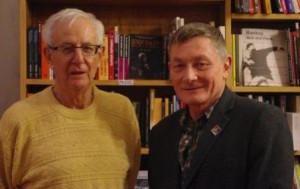
Looking back at the date of my History of the World document on my trusty old memory stick its 2004. That would suggest ten years, but there have been huge gaps. Looking at one of my old hard-backed notebook, this one is so old it is foolscap; I’ve discovered all the preparation notes written in pencil. There are descriptions of various locations and characters and the family tree of the central family, the Kuceras. Then theres a loose sheet of paper, also written in pencil with a time-line of what happened on various continents around the world. Theres no orderly system in this notebook, and a few pages further on I come across notes from the Genes and Society Festival dated 26/4/03, so I must have been thinking about this for a while. Now Im looking up my old diaries and find a.m. writing entered on 23 & 24 May with Gay Authors Workshop on the 25th. The first time I attended Gay Authors Workshop however, was on Sunday 22 June according to Dairy.
In July I’ve got more Writing in Diary, but this is for the Espresso Writing weekend with Mark Ravenhall. We wrote a play in a weekend! A week later I was sitting in shock getting feedback on my play from Mark. My Mum had died the night before and I was off to New Zealand for a funeral. I missed the next GAW meeting but managed to make the August workshop. Theres nothing now until November in the Diary because Im on tour with storyteller Rangimoana visiting Village halls around the country. Then with a long planned family holiday in New Zealand December and January, its not until February 2004 that I settle down and begin to write seriously and attend the monthly Gay Authors Workshops. I would read a chapter a time, which gave me an incentive to keep the copy flowing and also do re-writes and corrections. Theres nothing like reading out loud to spot mistakes and typos. I seem to continue attending intermittently on Sundays throughout 2005 and early 2006.
Things keep cropping up on Sundays in 2007 and often if I havent written anything I dont go to the workshops. I must have had a New Year resolution to write more as in January 2008 Ive written Writing day and Half Day Writing in my diary. Clearly this is another creative spurt and Im back doing the workshops. By early 2009 the writing is on the wall for creative funding and I decide to take a part time job as a doctors receptionist. This leaves little time for writing and when in 2010 Phillip & I go travelling around the world, I swap to travel bloging and writing 2284 stops. Ive left my characters stranded in Istanbul where they stay for almost two years.
The travel blog is a great success and when I return to London late in 2011, I have it published. I immediately solve the problem of how to rescue my characters in Istanbul and complete the book quite quickly over the winter months by going twice a week to the newly opened and heated Dalston Library. Most of 2013 was taken up with rewrites, edits, travelling to Norfolk to do a photograph for the cover and yet more edits, critiques from friends and colleagues followed by more corrections, until I know just about every sentence in the book by heart. I dont of course, and have to rehearse my selected bits in advance of the launch last Wednesday at Housmans book shop in Kings Cross. Theres a certain significance launching a book about a sex-worker in this part of town, even though the regeneration of St Pancras and Kings Cross stations is transforming the area. I also agonise over what to read as its quite difficult to avoid frequent sex scenes albeit described quite clinically. My teenage kids will be in the audience. In the end I decide not to worry. The story is what it is and friend, colleague and avid reader Jo has already told me its a page turner. Another friend, Ros says its well written, and thats a relief, but what will my friend from the gardening club in her late 80s make of it?
Theres over 30 people attending and the long narrow shop seems crowded with friends, relatives and members of Gay Authors Workshop and the publishing co-op, Paradise Press. David Gee goes first with an excerpt from his book The Bexhill Missile Crisis. This is set in the early 60s so its a rather large leap ahead to the year 2284 and my three pieces where I introduce sets of characters from different locations in the book. It all seems to go down well and David returns to read from his older publication Sheik-Down. Set in a gulf state and foretelling the possible outcomes of an Arab Spring. We have a short question and answer, the only one being from my friend Phil, who wants to know about the transition from being a playwright to novelist. Its good, having taught playwriting for so many years to realise that Ive taken my own advice, particularly about setting up the landscape and characters, so that the story almost tells itself. Whats even better, I sell copies, so with my insulated rucksack/picnic bag on my back, packed with un-drunk white wine and juice, surplus snacks in a bag for life and the remainder of the books in a small travel bag on wheels, its home to eat and have a glass of wine.
I could never answer GAW questions, How many words or pages will it be? I always think that a piece of writing is as long as it needs to be. How long did it take to write? It took as long as it took, in spurts, maturing in the pauses and gaps for mulling and reflection.
